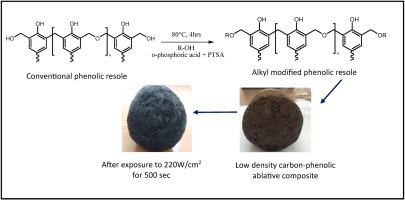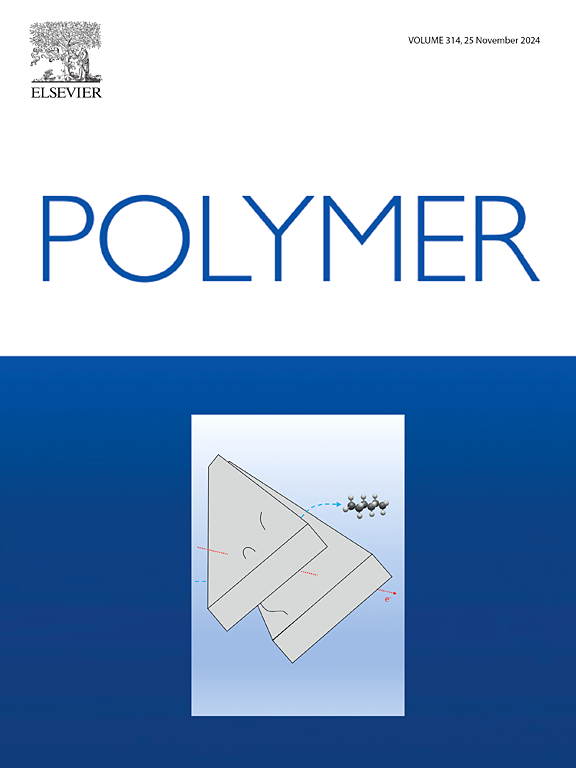Linear and branched alkyl chain modification of PF resin: Synthesis, pyrolysis and ablative performance at high heat flux
IF 4.1
2区 化学
Q2 POLYMER SCIENCE
引用次数: 0
Abstract
Alkyl modified phenolic resins were synthesized by acid catalysed etherification of Phenol formaldehyde resin (PF) using linear (n-propyl-NPA and n-butyl-NBA) and branched (iso-propyl-IPA and t-butyl-TBA) chain alcohols and characterized. Spectroscopic characterization (FTIR and 1H NMR) and hydroxyl value revealed the extent of etherification to be ca. 10–13 %. Enthalpy of curing was not significantly varied with etherification from the control PF resin. Mechanical property evaluation indicated an increase in elongation by 60–80 %. Glass transition temperature was about 135–144 °C vis-a- vis 148 °C for the unmodified PF resin. Thermal stability of the synthesized PF resins was not significantly altered and a marginal improvement in char residue (PF- 49 % and alkyl modified PF- 54–57 %) was observed at 900 °C. Low density carbon composites (0.70 g/cc) were processed using these PF resins as matrix resins and porous graphitic felt as reinforcement and evaluated their thermal and ablative characteristics. Alkyl modification improved the wettability of the graphitic felt and a reduction in backwall temperature was observed when the cured composites were subjected to Plasma arc jet at 220 W/cm2 at the end of 500 s.


酚醛树脂的线性和支链烷基改性:合成、热解和高热流密度下的烧蚀性能
以直链(正丙基- npa和正丁基- nba)和支链(异丙基- ipa和正丁基- tba)醇为原料,采用酸催化醚化法制备了烷基改性酚醛树脂,并对其进行了表征。光谱表征(FTIR和1H NMR)和羟基值显示醚化程度约为10-13%。与对照酚醛树脂醚化反应相比,固化焓变化不大。力学性能评价表明伸长率提高了60- 80%。未改性的酚醛树脂的玻璃化转变温度约为135-144℃,相对于148℃。合成的酚醛树脂的热稳定性没有明显改变,在900°C时观察到焦渣(PF- 49%和烷基改性PF- 54 - 57%)略有改善。以酚醛树脂为基体树脂,多孔石墨毡为增强材料,制备了0.70 g/cc的低密度碳复合材料,并对其热性能和烧蚀性能进行了评价。对固化后的石墨毡进行220 W/cm2的等离子弧射流处理500秒后,烷基改性提高了石墨毡的润湿性,并降低了后壁温度。
本文章由计算机程序翻译,如有差异,请以英文原文为准。
求助全文
约1分钟内获得全文
求助全文
来源期刊

Polymer
化学-高分子科学
CiteScore
7.90
自引率
8.70%
发文量
959
审稿时长
32 days
期刊介绍:
Polymer is an interdisciplinary journal dedicated to publishing innovative and significant advances in Polymer Physics, Chemistry and Technology. We welcome submissions on polymer hybrids, nanocomposites, characterisation and self-assembly. Polymer also publishes work on the technological application of polymers in energy and optoelectronics.
The main scope is covered but not limited to the following core areas:
Polymer Materials
Nanocomposites and hybrid nanomaterials
Polymer blends, films, fibres, networks and porous materials
Physical Characterization
Characterisation, modelling and simulation* of molecular and materials properties in bulk, solution, and thin films
Polymer Engineering
Advanced multiscale processing methods
Polymer Synthesis, Modification and Self-assembly
Including designer polymer architectures, mechanisms and kinetics, and supramolecular polymerization
Technological Applications
Polymers for energy generation and storage
Polymer membranes for separation technology
Polymers for opto- and microelectronics.
 求助内容:
求助内容: 应助结果提醒方式:
应助结果提醒方式:


